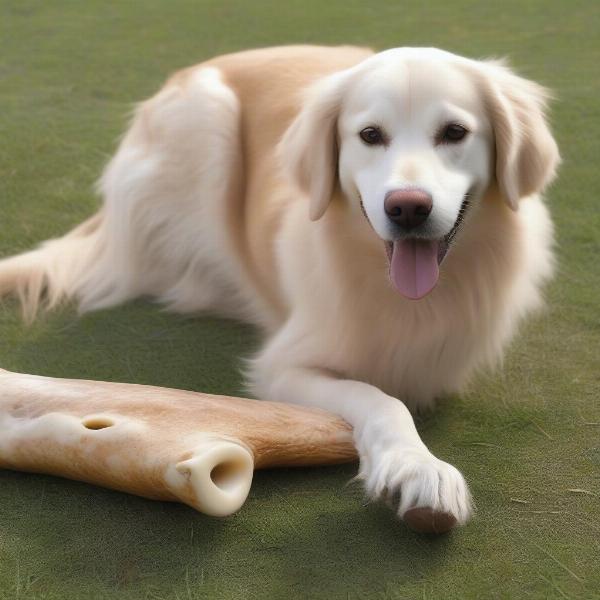Ostrich dog bones are gaining popularity as a natural, long-lasting chew for dogs. But are they the right choice for your furry friend? This comprehensive guide explores the benefits, risks, and everything you need to know about ostrich dog bones. From nutritional value to safety considerations, we’ll delve into the details to help you make an informed decision about incorporating this unique chew into your dog’s diet.
The Benefits of Ostrich Bones for Dogs
Ostrich bones offer a variety of benefits that make them an attractive alternative to traditional rawhide or beef bones. They are naturally low in fat, which can be beneficial for dogs watching their weight. They’re also a good source of essential minerals like calcium and phosphorus, contributing to healthy bone development and maintenance.
Ostrich bones are also known for their durability. Their dense structure provides a long-lasting chew that can keep dogs entertained and satisfied for extended periods, which can be especially helpful for anxious or energetic dogs. This prolonged chewing action can also help naturally clean your dog’s teeth and promote good dental hygiene.
 Dog chewing on an ostrich bone
Dog chewing on an ostrich bone
Potential Risks and Considerations
While ostrich bones offer many advantages, there are also potential risks to consider. Like any hard chew, pieces can splinter off, posing a choking hazard or causing digestive upset. Always supervise your dog while they are enjoying an ostrich bone and remove any small or broken pieces.
Another consideration is the size of the bone. Choose a bone that is appropriately sized for your dog’s breed and chewing habits. A bone that is too small can be easily swallowed whole, while a bone that is too large can be difficult for your dog to manage.
Are Ostrich Bones Right for Your Dog?
Ostrich bones can be a great addition to a dog’s diet, offering a healthy and engaging chew. However, it’s important to consider your dog’s individual needs and chewing habits. If your dog is a particularly aggressive chewer or has a history of digestive issues, it’s best to consult with your veterinarian before introducing ostrich bones.
How to Choose and Prepare Ostrich Dog Bones
Look for ostrich bones that are naturally processed and free of any added chemicals or preservatives. They should be clean and odor-free. You can find ostrich bones at many pet supply stores or online retailers.
Some dog owners choose to lightly bake or air-dry ostrich bones to further harden them and enhance their flavor. However, ensure they are not cooked at high temperatures, as this can make them brittle and more prone to splintering.
Alternatives to Ostrich Bones
If you are looking for other natural chew options for your dog, consider alternatives such as dog chew sticks made from bully sticks, sweet potato chews, or even how do you make chicken jerky for dogs for a homemade option. Always prioritize safety and choose chews that are appropriate for your dog’s size and chewing habits. You can also consider bone meal for dogs as a supplement for added nutrients.
Conclusion
Ostrich dog bones can be a healthy and enjoyable treat for your canine companion. By understanding the benefits, risks, and proper selection process, you can make an informed decision about whether or not ostrich dog bones are a good fit for your furry friend. Remember to always supervise your dog while chewing and choose a size-appropriate bone to ensure their safety and enjoyment.
FAQ
- Are ostrich bones digestible? No, ostrich bones are not fully digestible. However, they break down more easily than some other types of bone, reducing the risk of blockages.
- How often can I give my dog an ostrich bone? Ostrich bones should be given as an occasional treat, not a daily staple.
- Can puppies have ostrich bones? It’s generally best to wait until a puppy is at least six months old before introducing ostrich bones.
- What should I do if my dog swallows a large piece of ostrich bone? Contact your veterinarian immediately.
- Can ostrich bones replace a balanced diet? No, ostrich bones should be considered a supplemental treat, not a replacement for a complete and balanced diet.
- Where can I buy ostrich bones for my dog? You can purchase them at most pet supply stores or online. Be sure to choose a reputable supplier that offers high-quality, naturally processed bones.
- Are there any dog breeds that shouldn’t have ostrich bones? Dogs with a history of digestive issues or aggressive chewing habits may not be suitable candidates for ostrich bones. Consult your vet.
ILM Dog is a leading online resource for dog owners worldwide, providing expert advice on all aspects of dog care, from breed selection and health to training and nutrition. We offer practical tips and insights to help you provide the best possible care for your furry companion. Our expertise covers a range of topics including choosing the right breed, maintaining your dog’s health, training effectively, providing optimal nutrition, grooming and hygiene, suitable products and accessories, and much more. Learn more and discover the joys of responsible dog ownership with ILM Dog. Contact us via email at [email protected] or phone at +44 20-3965-8624.